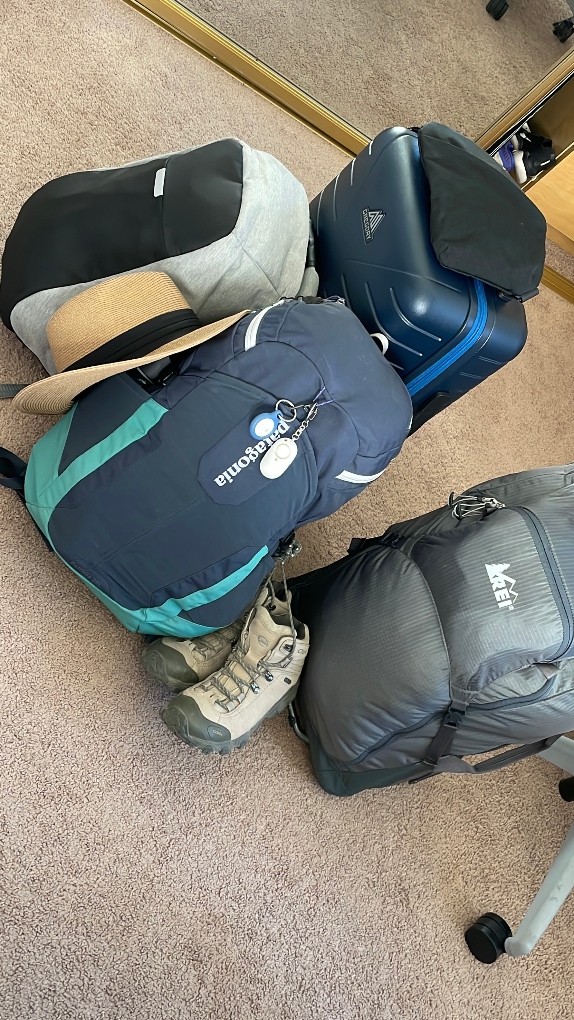Guide to Working Remotely Abroad For a U.S. Company in 2025
In recent years there has been a huge shift in mindset towards location-independent workplaces. Many of us have a unique opportunity to work fully or partially remotely. Many people have been wondering if they can experience living or traveling abroad while working remotely for a U.S. company.
My boyfriend and I are currently digital nomads and U.S. citizens who are working for a U.S. company while traveling to multiple different countries around the world. This is a comprehensive guide for what you need to know to work remotely abroad while being employed in the United States, including what laws and regulations you will have to follow.

Is It Possible to Work Remotely Abroad for a U.S. Company?
YES, working remotely abroad for a U.S. company is possible. As a U.S. citizen, you can work for a U.S. company while traveling or living in another country so long as you still follow U.S. tax laws, acquire the appropriate visas, and secure permission from your company to work internationally.
This opens up a world (quite literally!) of possibilities for you.
Have you been dreaming of working from a beach or traveling the world on your weekends?
If you have been thinking about how you can take advantage of your work-from-home lifestyle, then take this as your sign to JUST DO IT.
NOTE: If you are NOT a U.S. citizen, much of this article can still apply to you but you will want to do more research on your specific situation. You will also want to look into filing a W-8BEN form.
The Legality of Working Internationally While Employed by a U.S. Company*
We will touch on different types of employment with U.S. companies further down this guide, but everyone looking to work while traveling or living abroad must follow local labor laws and check to see if you require a work permit or specialized visa.
Visas
With a longer trip abroad in mind, visas will play a big role in where you decide to work remotely. Consider how long you want to be away from the U.S.
This may determine how long you can stay in a country or if you need to consider splitting your time between a few different countries. More often than not, countries will have tourist visas available for U.S. citizens to travel for 1-3 months, and some allow for extensions.

90-Day Visas and the Schengen Visa
The most typical visa is 90 days. Many countries across the globe honor a 90-day tourist visa for Americans. Some countries allow you to leave (visit a neighboring country) and return to renew your 90 days.
Some countries (most often European ones) will have stricter policies. The EU (European Union) for example, includes 27 countries (member states). As a tourist, you can visit 22 of them by having a “Schengen visa”.
The Schengen visa is a travel agreement that allows tourists (which is what you are considered even as an American working remotely) to stay for up to 90 days within a 180-day period in these areas. After that period, you must leave ALL countries that fall under the Schengen visa.
Not all EU countries are part of this travel agreement, in which case you can stay in Europe by traveling to a non-Schengen country for another 90 days.
You can work remotely for a U.S. company from Europe if you follow all visa regulations and/or acquire the necessary work permits.

Longer Stay Visas
If you are hoping to go abroad to one location for longer than 90 days, such as a year or more, you will have to plan a lot more thoroughly. You will likely receive some tax benefits for being out of the U.S. for over a year. However, visas will be more challenging and you may run into issues with the foreign country’s tax system.
One way to stay working remotely abroad for longer is to travel for shorter periods of time as your visas expire. Or leave and re-enter when you can (while staying under the allotted period before you become a tax resident).
Some countries will allow you to stay longer than the normal visa with extensions if you are there for “business purposes” (which you will be), so long as you stay employed by your domestic employer and do not try to work for a company in the country you are visiting.
Or, a digital nomad visa might be a good option for you as well.

Digital Nomad Visas
Many countries are starting to implement a special type of visa to attract remote workers to stay for extended amounts of time, the idea being digital nomads can pour money into the economy without taking local jobs.
The length of stay varies on the country as do the qualifications, though you are typically expected to meet a minimum income while working remotely abroad.
Some digital nomad visas last a few months up to a year, Bali is even working on a 5-year digital nomad visa! Which will truly open your options for staying and working abroad for longer.
Do your research before you go! There are many options for extending visas, but there can be big fines and penalties for overstaying a visa that can be avoided with some simple planning.
Keep in mind that on most tourist and digital nomad visas, it’s prohibited for remote workers, whether contractors or employees, to engage in any “economic activities,” including:
- Delegating tasks to the local workforce
- Accepting employment with local subsidiaries or employers
- Marketing goods or services in the local market where you’re stationed

Understanding Tax Rules and Laws as a U.S. Citizen Living Abroad Working for a U.S. Company
You still need to pay U.S. taxes when you work remotely abroad!
Many people think taxes will stop applying to them as soon as they leave the U.S. – this is NOT true. Most people will continue paying taxes to the state they live in OR to where the company is located (in some states).
Since U.S. taxes are based on citizenship, even if you apply for citizenship in a new country you would still have to pay taxes to the United States. The only way you would be able to stop paying U.S. taxes is if you denounce your U.S. citizenship, but that is a very big deal and a decision you should not take lightly.

Many countries will allow foreign remote workers to stay and continue their remote work for up to 183 days a year. After that point, it’s possible you will be seen as a tax resident in the country you are working abroad from and have to pay both foreign taxes AND your U.S. taxes.
Some countries might have a one-year tax exemption for digital nomads. Make sure to check with the country you are visiting to understand the local tax rules.
Overpaying in U.S. Taxes and How to Save Money
You can always claim refunds and show proof of travel if you believe you overpaid in U.S. taxes, especially if you are away for more than 330 days of the year.
TIP: Get a virtual mailbox when you are abroad.
Look into if a virtual mailbox could work for you, as it’s possible to have an address in a tax-free state.

Social Security and Medicare Taxes When Working Abroad
If you work remotely abroad for a U.S. company, your Social Security and Medicare taxes will still be deducted from your salary.
Taxes for Freelance Workers and Independent Contractors With American Companies Abroad
If you are more of a freelancer or you plan to be away for more than 330 days of the year, you may have much more flexibility with your U.S. taxes and should look further into what you could possibly save.
If you are an independent contractor, so long as every aspect of your work is performed outside of the U.S., then your income isn’t considered U.S.-based and you will not need to pay U.S. taxes.
Figuring out your taxes while working for a U.S. company and traveling abroad can be extremely confusing. I use Taxes for Expats to make sure I save as much money as possible while I am living abroad. They provide great information for people living and working remotely abroad to help with filing your U.S. taxes.
➡️ CLICK HERE FOR $25 OFF TAXES FOR EXPATS
Approaching Your U.S. Company About Working Abroad
This may be the scariest part of thinking about international remote working for some people, and the easiest part for others. The advice I always give is to:

✔️ Go in with a PLAN
Know exactly what you are going to say to your boss, consider the counter-arguments, and do your research.
✔️ Create a Proposal
If you never worked remotely for your company, but know your job is capable of being remote, create a proposal for how you would complete your tasks each day.
Include when and how you will check in, what deadlines you will make sure to meet, and how you will structure your days and work hours.
Many companies will want to know that your move is not permanent and that you will still bring the same quality of work. They will also be concerned about the (probable) time difference for meetings and deadlines.
You will need to be ready with how you plan to make your travels work for THEM and have consistent access to the internet.

✔️ Inform Your Company About Tax Rules
As long as U.S. rules apply and their employees (you) are doing work that benefits the U.S. company, they should not see a detriment to their taxes.*
✔️ Appeal to the Human / Emotional Side of Your U.S. Company
Remember that your company is made up of humans!
They probably wish they could be off exploring the world while making the same American salary too, so appeal to them on a human level.
Let them know what you will learn from traveling the world, and how it can benefit THEM as a company to let you experience a new culture for a while.

Pay and Benefits
You may have to discuss potential changes to your pay and benefits. Your benefits especially may be subject to change. You will likely not receive sick pay or other benefits while living abroad.
Insurance Benefits
Your insurance benefits will also not likely cover where you will be moving to. However, there are still ways to work around this.
Travel insurance, for example, is necessary when traveling anywhere. This type of insurance might be good enough for a short period to supplement your current insurance plans while you are away.*
Consider looking into travel insurance such as SafetyWing. I use and recommend SafetyWing because it is affordable, reliable, and most importantly it is specifically designed for digital nomads and long-term travelers.
Depending on your plan, you will be covered for medical emergencies, trip cancellations, property protection, and more.
For an idea of how much insurance will cost you while living abroad, use the tool below. Or, to purchase insurance directly from SafetyWing, CLICK HERE.
Salary and Pay While Abroad
You may have to negotiate with your current U.S. employer if your salary/pay will change while you’re abroad. In most cases, you should receive the same amount of pay in the U.S. or in a different country, but this is a discussion and negotiation you may need to be prepared for.

Do some research into the price of living where you are interested in working remotely. You will find many countries have a much lower price of living than the U.S.
So, while losing your benefits may seem like a disadvantage, it really might not be when you consider the price of living in a cheaper country while maintaining your U.S. salary.
How to Prepare for Your Move to Working Remotely Abroad
Now that you know the basics of the rules and regulations to transition to international remote working, all the fun of actually planning to move abroad begins! There are a handful of important things to think about and plan for before you up and leave America.
Picking the Right Country(ies) to Work Remotely From
When picking the right country to work remotely abroad from, there are a few things to take into consideration.
✔️ Affordability
Many countries will be cheaper than the U.S. such as countries in South East Asia or South America, and even some countries in Europe (i.e. Hungary). If you have a bigger budget you can certainly expand your search.

✔️ Comfort Level
Do you want to live in a country that speaks English?
Do you want to be in a big city where you have a lot of resources?
Or, are big cities not your jam and you want something with a slower pace of life such as the mountains or beach?
Do a little research on cities you may not have thought of in the countries you are interested in. You may be surprised to find a city that matches your needs but is not one you are familiar with!

✔️ Time Zones
If you are perfectly fine working non-traditional or odd hours of the day, that’s great!
For many people, you may want to consider a country that is close to the U.S. and keeps you in relatively the same time zone as your office.
If you are a freelancer or have more flexibility – that’s great! One of my favorite parts of being a digital nomad is getting to choose when and where I work, so long as I meet deadlines and return projects in a timely manner.

✔️ The Fun of Working Remotely Abroad
Do you want to try and live in a beach town? It’s likely cheaper abroad than in the U.S.!
Do you want to be in a busy hub where you can easily travel to new locations on the weekends?
The best part of moving abroad is changing up your lifestyle and challenging yourself to step out of your comfort zone into new cultures and new experiences.

💡 TIP: Sign up here for the best FREE flight deals alerts – Scott’s Cheap Flights
Add your airport and keep an eye out for any flight drops or deals.
How to Find Housing Abroad
Depending on your country of choice you may be able to find housing before you leave. Or, you can travel to your destination and stay in a hostel or hotel before you find a longer-term stay.
Either way, I recommend researching some options before you go, so you know how difficult it may or may not be to find accommodation for the length of your stay.
Get creative when looking for housing! There are plenty of unique options for where to stay and work remotely.

Here are a few housing options to look into when working remotely abroad:
✔️ TrustedHousesitters
If you are taking a more “nomadic” approach and plan to move locations frequently while working remotely abroad, my best tip is to look into a site called TrustedHousesitters.
This site helps people find someone to watch their pets while they are away from home. In return for watching their pet, you get somewhere to stay for FREE!
There is a yearly fee that starts at $129 to sign up, but if you plan to use the service more than two or three times then it is well worth the cost.
➡️ CLICK HERE TO SIGN UP FOR TRUSTEDHOUSESITTERS

✔️ Hostels
I love staying at hostels, especially during my first week in a new city or country to get myself oriented. There are many hostels nowadays that are geared more towards remote professionals such as Selina co-working hostels.
Not only do hostels tend to be a more budget-friendly international housing option, but they are also a fantastic way to meet like-minded people when moving to a foreign country.
In most hostels, you can rent a private room or a shared dorm room. Many now have shared working spaces and most have reliable WiFi. Some even have kitchens or provide breakfast.
I highly recommend at least starting at a hostel, so you can meet people who can give you insight into your new work abroad country.
➡️ CLICK HERE TO SEARCH HOSTEL LISTINGS

✔️ Any Place
Many countries are making it easier and easier for digital nomads and remote workers to find housing that is flexible for the length of time they need and is furnished to be move-in ready.
Any Place offers stays worldwide that are specifically designed for remote workers with a built-in office and reliable WiFi already set up. Flexible leases and options from private apartments to co-living accommodations give you a wide range of options.
Rent, utilities, and WiFi are included in the monthly rate, but there may also be a security deposit or maintenance fee. Additional fees are found on the information page of the property you are interested in.
➡️ CLICK HERE TO CHECK OUT ANYPLACE

✔️ Housing Anywhere
This is a similar service to Any Place but is more specific to finding accommodation in Europe.
✔️ Vrbo
Vrbo vacation homes are always private and they have the option to look for places for a month or more at a time for a discounted price.
✔️ Hotels and Vacation Rentals
You could check with hotels and vacation rentals in your destination to see if they have any long-term stay discounts or options, especially if you will be living abroad during the low season.

✔️ Check local rental websites
Finding a place that is fully furnished and includes utilities will be your best option to avoid the hassle and time of trying to set things up in a new country.
However, if you plan to stay abroad long-term you may want to rent and furnish your own place. Check local rental sites or even Facebook groups to see what kind of options are available for rent. Or, you might be able to find a room for rent to help with the cost.
🏠 For more tips on finding housing abroad, read my full article on how I found accommodation in Dublin, Ireland.
Looking for resources to use for your next trip or move abroad?
CLICK HERE for my favorite travel and expat tools!
Packing for Extended Time Abroad
Now, I’ve done many 3-6 month trips by now and it never quite gets easier to pack for long trips abroad, but I have learned many tips and tricks by now.
If you plan on being gone for a year or more, you will likely want to pack as much as you can in suitcases that you can take on the airplane and then potentially ship some boxes as well.
If you are going for about 4 months, give or take, you can get away with a carry-on and a big checked bag. Unless you plan to move cities more frequently, in that case, I always travel with a backpack and carry-on size bag.
In either case, you will want to travel with less than you think! Remember that you can buy toiletries, clothes, housing items, etc. when you arrive so think more about packing the essentials and things you won’t be able to find outside of the U.S.

Here are a few tips when it comes to packing for working remotely abroad:
- Research Climate and Culture: Understand the weather conditions and cultural norms of your destination to know the type of clothing and accessories you need to pack.
- Pack Versatile Clothing: Opt for versatile, mix-and-match clothing items to create various outfits. Include items suitable for different occasions, from casual wear to formal events.
- Essential Documents: Organize and pack all essential documents, including your passport, visa, travel insurance, and any necessary permits. Keep both physical and digital copies in a secure place.
- Medications: Carry an adequate supply of any prescribed medications you might need during your trip.
- Electronics and Adapters: Bring essential electronic devices, such as a laptop, smartphone, and camera. Don’t forget to pack the necessary adapters and chargers that are compatible with the electrical outlets in your destination country.
- Personal Items: Don’t forget to pack personal items such as your favorite book, journal, or any other items that bring you comfort and joy during your extended journey.
U.S. Citizen Living Abroad Working Remotely for a U.S. Company
You’ve made it abroad! But now what? These are the first steps I take when getting to a new country/city to set myself up for success while working abroad.
Set up Your International Remote Work-Space
When you arrive at your destination you will want to make sure you find an easily-accessible workspace that meets all of your needs. If your housing option does not have any space for you to work, you may want to consider finding a co-working space.
Co-working space is becoming increasingly popular across the world. Often you can rent a desk or a room by the day or month. These spaces should provide you with internet access, a printer, and basic office supplies.

Make Friends While Working Remotely Abroad
This is somehow always what I end up worrying about the most when I go abroad, but travelers are some of the most open and friendly people you will meet. The friends I make always end up being the best and most rewarding part of my travels.
The key to making friends abroad is to truly put yourself out there and have a great attitude towards everything you try. Join meet-up groups, check on Facebook for local events, take workout classes, take a hobby class, volunteer with an organization… get creative!

Exploring Your Remote Work Abroad Country
You have put in all the hard work of moving out of your home country, now you get to reap the benefits of working remotely abroad for a U.S. company! Explore your new city as much as you can throughout the week.
Take your work to different coffee shops, try interesting food for dinner or stop by local markets to pick up food to cook, take the public transit somewhere different, and make a list of all the unique things you find to do in your new city.

Live like a local during the workweek and travel somewhere new on the weekends!
Research day trips and weekend trips, can you fly to nearby places for cheap?
Is it easy to take a bus or rent a car?
Get out of your city, explore the surrounding areas, and try new activities. Often that is where you will find the most unique cultural experiences and unforgettable moments.
Try to learn the local language before you arrive. You will get a much deeper experience if you try to embrace living as much like a local as possible. There are so many resources online (or once you arrive) to learn a new language. Take a class, listen to podcasts, and go out and talk to new locals to practice your skills.

CONCLUSION: Can I Work for a US Company and Live Abroad
It is totally possible to work for a U.S. company and travel frequently or live abroad! Many countries outside of the U.S. already have much more relaxed views on work-life balance and what it means to complete a job. The pandemic and switch to more remote working have given us a much-needed taste of what it could look like to actually have a life outside of your job.
Start by making a list of what you need to look into for your move abroad: visas or work permits, taxes, rules and regulations in the country you’re looking at moving to, talking to your U.S. company about working remotely abroad, packing, and finding housing and settling in.
While the idea of transitioning to international remote working might seem daunting, with some research and preparation you will find it’s not nearly as difficult as it seems – and the end result will be well worth any hassle to get there!
*I in no way claim to be an expert on taxes or legal matters. Please do your own research and confirm that all of my suggestions and tips apply to your situation and location. I simply want to spark the idea and help you know what you will need to look into and keep in mind!








These are such good tips! Love the ‘what to do when you get abroad’ section!